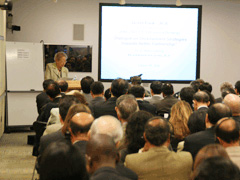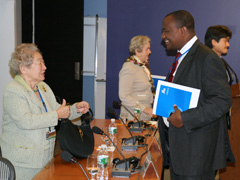- Home
- About JICA
- President's Desk
- Former President's Visits & Remarks
- OGATA Sadako
- New Solutions Are Needed to Help the World’s Poorest People
OGATA Sadako
October 15, 2008
New Solutions Are Needed to Help the World’s Poorest People

Mrs. Ogata addresses the 130 seminar delegates
With the world undergoing a series of massive changes and the international donor community also in a state of flux, new solutions are needed to help hundreds of millions of the world’s poorest people, according to Mrs. Sadako Ogata, President of the Japan International Cooperation Agency (JICA).
She spoke Tuesday (October 14) in Washington at a conference co-hosted by JICA and the World Bank two weeks after her organization effectively became the world’s largest bilateral development agency following a three-year reorganization of Japan’s Official Development Assistance (ODA) system.
Threats represented by the current financial crisis, climate change, food and energy crises and the spread of widespread infectious disease represent “a series of tectonic changes rarely seen throughout our history,” Mrs. Ogata said.
No country, not even rich nations, are immune, but inevitably the world’s most vulnerable people will suffer the most, the JICA president said, particularly the so-called ‘bottom billion’ people.
Fundamental Change

Mrs. Ogata greets an African delegate
Mrs. Ogata noted that while trying to help these populations, the international donor community was itself undergoing fundamental change. Traditional donors such as Japan, the U.S. and Europe are being joined by ‘emerging’ donors such as China and India. Sovereign and private investment funds are also playing an increasingly important role in providing assistance to developing countries.
On October 1 JICA merged with the soft loan arm of the Japan Bank for International Cooperation (JBIC) to become the world’s largest bilateral development aid agency with an operational volume of approximately US$10 billion and operations in some 155 countries.
Mrs. Ogata explained some of the advantages she expects to flow from the reorganization. For the first time, a single agency will be able to provide ‘a complete package of assistance’ including technical help, grant aid and soft loans for medium to long-term development.
James Musoni, Rwanda’s Minister of Economic, Finance and Planning, responded that such a “bold step to integrate these different mechanism” would be particularly helpful in assisting African countries with their development planning.
Mrs. Ogata said JICA’s future operations will be guided by three basic principles, or what she termed the 3S’s of ‘scaling up’ ‘speeding up’ and ‘spreading out.’
‘Scaling up’ means making more effective use of newly combined assets for both physical infrastructure projects and strengthening institutional and human capacity, she explained. JICA would strive to ‘Speed up’ projects, particularly in natural disaster or post-conflict situations such as Southern Sudan, offering not only immediate emergency help but also medium to long-term assistance. ‘Spreading out’ means closer coordination with agencies such as the World Bank and partner countries to help provide more effective programs which can reach wider groups of recipients.
Ms. Okonjo-Iweala, the Managing Director of the World Bank, warmly welcomed the guidelines and said “each principle applies equally to us.” Bank President Robert Zoellick said his organization “will continue to cooperate closely with new JICA and continue to develop programs for operations and research.” He stressed the need for “continuous dialogue, knowledge sharing and operational cooperation” among donors.
Mrs. Ogata highlighted the recent establishment of the JICA Institute which, she said, would attract both domestic and foreign scholars to explore the issues of development assistance and a start had already been made in studying the different patterns of Asian and African development patterns and Ms. Okonjo-Iweala promised that while it is Mrs. Ogata’s “vision that JICA become a center of excellence for development research, we will work with JICA on this objective.”
The problems “facing people in developing countries are complex, diverse and ever changing,” Mrs. Ogata told her audience. “To meet their needs, it is important to offer them creative and effective solutions.”
One of the most important of those fundamental solutions, she said, was promoting a “virtuous cycle of economic growth and poverty reduction.” In other words, agencies such as new JICA must encourage a combination of both overall economic growth in developing countries in addition to promoting specific projects designed to alleviate poverty.
- About JICA
- News & Features
- Countries & Regions
- Our Work
- Thematic Issues
- Types of Assistance
- Partnerships with Other Development Partners
- Climate Change / Environmental and Social Considerations
- Evaluations
- Compliance and Anti-corruption
- Science and Technology Cooperation on Global Issues
- Research
- JICA Development Studies Program / JICA Chair
- Support for the Acceptance of Foreign HRs / Multicultural and Inclusive Community
- Publications
- Investor Relations
